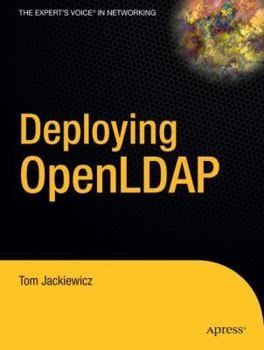Deploying OpenLDAP
Select Format
Select Condition 
Book Overview
For all the work and time invested in using LDAP, not enough time has been spent designing the layout and the logic of directories. End users and system architects often don't give appropriate attention to the deployment of LDAP as a standards-based system with interfacing ability. Thus, many of LDAP's best features--especially OpenLDAP--become unusable. As a remedy, Deploying OpenLDAP delves into the logic, theories and fundamentals of directories...
Format:Paperback
Language:English
ISBN:1590594134
ISBN13:9781590594131
Release Date:October 2004
Publisher:Apress
Length:311 Pages
Weight:0.05 lbs.
Dimensions:0.8" x 7.1" x 9.4"
Customer Reviews
5 ratings
bonus over other ldap books
Published by Thriftbooks.com User , 19 years ago
this book has real appeal. i was fortunate enough to pick it up off the book shelves. the in-depth analysis of LDAPv3 all all it's intracacies is fluent throughout the book. i really enjoyed the implementation section. not only have were the commands infinitely useful to my deployment, and other deployments i've seen in the field since - but it adds character and background you won't see in other books. for example, the naming of hosts and the reference to the IETF RFC's made me extremely happy. nobody except the best make casual calls to such sources. this is certainly the best LDAP book for the tech community.
Much better than X.500/X.400
Published by Thriftbooks.com User , 19 years ago
Whatever happened to the glorious dreams for X.500 and X.400? Roughly speaking, as explained in the book, they were found by many to be simply too cumbersome and overreaching. LDAP and its latest incarnation as OpenLDAP, has largely supplanted X.500 in terms of actual implementation. I recommend the book's Introduction as a succinct history of how LDAP arose in the 90s. It summarises the many RFCs that went out for it and X.500. Gradually, we see the convergence to today's state of affairs. Which the rest of the book explains in detail. Amusingly, we find that at one point, the X.500 proponents were expecting it to supplant TCP/IP!? Such amazing conceit. Well, LDAP blew it away. You get advice on installing OpenLDAP. Which is actually pretty straightforward. An experienced sysadmin will not have any problems here. Then there follow several chapters on running it and also writing code to program it. OpenLDAP comes with an API that does require some explanations. Luckily, the API can be accessed via calls in several languages like C and Java. Perl examples are also supplied. The author is commendably ecumenical about supplying example code in several languages. In keeping with the open source spirit of this project.
Very solid introduction
Published by Thriftbooks.com User , 19 years ago
This is a very solid, end-to-end walkthrough of installing, configuring and using OpenLDAP. Client code comes in a number of languages; C/C++, Java and Perl. The text is well written and very easy to follow. My only complaints are the graphics are used a little too sparingly. And I would have like to have seen more emphasis on LDAP policy, as opposed to the straight technical information presented. Minor complaints aside, this is an excellent introduction to OpenLDAP for IT engineers looking to deploy it.
modern overview of ldap
Published by Thriftbooks.com User , 19 years ago
I've read some of the other LDAP books out there and have always complained that they are a bit dated. This book covers modern features of LDAP, reinforces the standards, and is easy to read. This book covers more recent RFC's that are typically not even mentioned in other references. It also encompasses both commercial and open source solutions to problems of scaling, standards, and interoperability. Multiple solutions to problems are given for your benefit. Multiple programming languages are covered to make this a complete reference.
Great reference on LDAP deployment
Published by Thriftbooks.com User , 19 years ago
This is a great overview that covers all the necessary components of an LDAP deployment, whether you use OpenLDAP or any other implementation. Tom Jackiewicz covers everything from the management decisions necessary before you start your deployment, to the schema, directory information tree, and then goes on to more details topics on the installation and API. This is a fast paced book and covers in just a few pages what other books fill with useless garbage and repetition.





